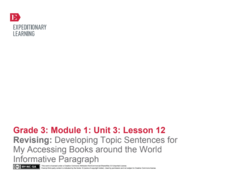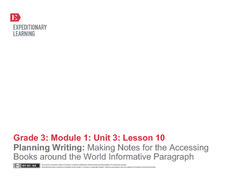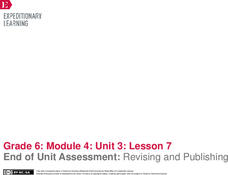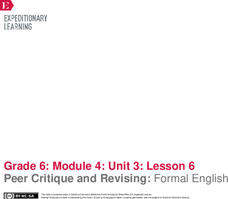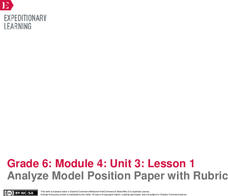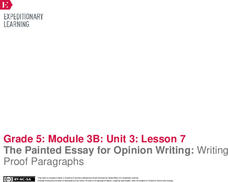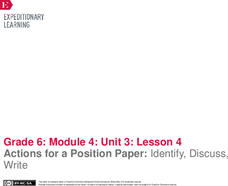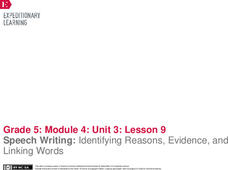Curated OER
Weather Group Creative Writing
For this weather writing worksheet, students collaborate with a group to write a story about weather. Students have 25 minutes to write a story using the 16 weather words in the box.
Curated OER
Spooky Analysis
Focus on building suspense as well as evaluating web sites through creative writing. After introducing the idea of suspense and holding a discussion, class members complete a WebQuest, during which they find inspiration for their own...
Curated OER
Tyrone, the Horrible
Read a Hans Wilhelm story and complete creative writing activities. Start by reading Tyrone, the Horrible and discuss the behavior in the book. Then split your class into groups to create a "bully" situation and discuss possible...
Music Publishers Association of the United States
I Made It. I Own It. Please Don't Steal It.
Explore the world of copyright law with a variety of activities to instill the importance of respecting creative property. Scholars watch an animated tale then take part in a grand conversation detailing the video's main idea, details,...
EngageNY
Revising: Developing Topic Sentences for My Accessing Books Around the World Informative Paragraph
Revision is an important part of the writing process. Focus on revising topic sentences and details with the plan described here. This is part of a unit, so pupils have already filled out a graphic organizer about traveling...
EngageNY
Revising: Strong Conclusions for My Accessing Books Around the World Informative Paragraph
It's important that writers leave their readers with a strong and satisfying conclusion. Help your young writers develop the skills to compose a concluding sentence with the steps outlined here. After class members have had a chance to...
EngageNY
Revising My Accessing Books Around the World Informative Paragraph for a Hook to Captivate My Reader
While this is considered optional within the unit it is designed for, pupils would benefit from the listed activities. Working on writing and revising a paragraph about librarians who travel to isolated areas, class members can add some...
EngageNY
Performance Task Preparation: Peer Critique and Mini-Lesson Addressing Common Errors: Revising Draft Essay to Inform
Time to revise! Using a writing evaluation rubric, scholars participate in a peer editing process to provide feedback on each others' informative essays. Next, pupils begin revising their drafts based on the feedback they receive.
EngageNY
Planning Writing: Making Notes for the Accessing Books Around the World Informative Paragraph
Encourage your young writers to thoughtfully plan and organize their work. First, model how this is done and vocalize your thought process as you work. Next, create a class list of strategies that they can use during independent writing...
EngageNY
Writing a First Draft: Accessing Books Around the World Informative Paragraph
Supervise the final drafting of a well-organized paragraph by following the steps outlined in this plan. Using the included sample paragraph as a model, class members brainstorm criteria for quality work and then compose their paragraphs...
EngageNY
Paragraph Writing: The Role of Religion in Colonial America
Informative writing is emphasized in the standards. Help your learners reach that goal with the plan for paragraph writing outlined here. After reviewing the work from the day before and adding to their vocabulary notebooks, class...
EngageNY
End of Unit Assessment: Revising and Publishing
Dictionaries, thesauruses, word walls, oh my! Pupils use several resources to revise their position papers to include appropriate vocabulary. Then, after peer editing, scholars write the final drafts of their essays and self-assess using...
EngageNY
Peer Critique and Revising: Formal English
Dear Sir or Madam: What's the difference between formal and informal language? Scholars focus on using formal English and transitions in their position papers. After revising their rough drafts, they engage in the peer editing process...
EngageNY
Analyze Model Position Paper with Rubric
It's time to choose a position! Scholars read a model position paper about fracking to practice identifying the topic and argument. Then, working with a partner, they use a rubric to assess the essay.
EngageNY
Storyboard Revision: Managing the Sequence of Events and Using Sensory Details
Mastering techniques from the resource, pupils give life to their writing, revising their storyboards to include sensory details and transitions. To finish, they participate in a peer critique process and use the feedback to further...
EngageNY
The Painted Essay for Opinion Writing: Writing Proof Paragraphs
It's time to proof read! Pupils read and analyze proof paragraphs from a model essay. They then practice writing their own proof paragraphs to express an opinion about offshore oil drilling.
EngageNY
Speech Writing: Identifying Criteria for a High-Quality Introduction
Using a helpful resource, pupils watch a TED Talk of an opinion speech as they consider the criteria for a high-quality introduction. Scholars then engage in a shared writing process with the teacher to practice writing the introduction...
EngageNY
Speech Writing: Identifying Criteria for a High Quality Conclusion
Learning is never-ending. Scholars learn about effective conclusions as they continue watching a video of an opinion speech. After analyzing the speech's conclusion, they work in small groups to write an ending for their own speeches.
EngageNY
End of Unit 3 Assessment: Writing a Research Synthesis
Ready, set, write! Scholars work on the end-of-unit assessment by completing a writing prompt. They then look at the model performance task from instructional activity two to create a rubric for scoring the exercise. Using turn and talk,...
EngageNY
Planning for Writing: Introduction and Conclusion of a Literary Analysis Essay
First and last impressions are important. Using the helpful resource, scholars draft the introductory and concluding paragraphs of their literary analysis essays. Next, they use a writing evaluation rubric to self-assess their work.
EngageNY
Actions for a Position Paper: Identify, Discuss, Write
Anchors aweigh, it's time to write! After viewing an anchor chart detailing the parts of a position paper, pupils share their plans for their essays with a partner. Next, they write the rough draft of their body paragraphs.
EngageNY
Peer Critique and Revision: Storyboard, Sections 1-4
Teamwork makes the dream work. Pupils participate in a peer critique process, using forms to offer constructive advice about each other's storyboards. Next, scholars revise their storyboards based on the feedback, and then share their...
EngageNY
The Painted Essay for Opinion Writing: Developing a Conclusion and Adding Linking Words
Let's get colorful! Scholars use the Painted Essay technique to analyze and color code the conclusion of a model essay. Working in small groups, pupils then write a conclusion paragraph for their draft editorials about offshore...
EngageNY
Speech Writing: Identifying Reasons, Evidence, and Linking Words
Enjoy the view. Scholars continue viewing a video of an opinion speech, this time identifying the supporting evidence the speaker employs. After watching, they work in small groups on their shared writing projects, crafting a body...






